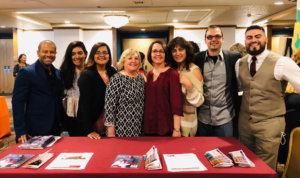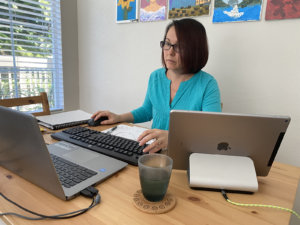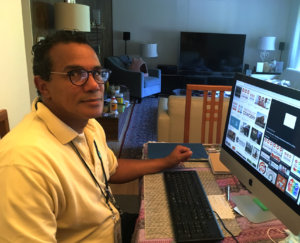This content block does not have a preview.
“Stopping our work would be a huge disservice to this population who has been screaming for more help and more services even before the coronavirus.”
— Daniel Garcia
It’s a long road to recovery, and building a supportive community is a crucial step along the way. That is especially true at Central City Concern’s Puentes program, where members of Portland’s many Latinx communities find culturally specific support for navigating recovery and fostering wellness.

The Puentes team forms bridges among individuals, communities and resources. From Left: Daniel Garcia, Director of Latino Services; Nuvia Chavez-Tellez, Mental Health Counselor; Marysol Jimenez, Youth Alcohol & Drug Counselor; Cindy Ross, Office Manager; Maide Almeida, Alcohol & Drug Counselor; Ivette Iparraguirre, Alcohol & Drug Counselor; Albert Parramon, Clinical Supervisor; Cesar Ramirez, Mental Health Provider. Not pictured: Gabriela Lule, Jesus Mendoza and Ricardo Verdeguez.
Puentes uses a multidisciplinary approach to provide alcohol and drug treatment and mental health care to individuals and families in a way that reduces stigma and fear. Puentes staff are bilingual, bicultural and deeply rooted in our Latinx community. The 11-person team includes certified alcohol and drug counselors, a recovery mentor, mental health providers and more.
Like many of those served by CCC, Puentes clients are particularly vulnerable to the disruptions caused by COVID-19. Systemic racism and lack of access to healthcare and other services cause disparities that are only exacerbated by the current pandemic. In Washington County, Latinos account for almost half the known cases of coronavirus infection — despite making up only 16% of the population.
“This has been devastating,” said Daniel Garcia, Director of Latino Services at CCC.
Many Puentes clients have lost jobs. Many have lost housing, or are teetering at the edge of homelessness. Many did not receive the stimulus check received by other taxpayers, nor are they eligible for state unemployment benefits. Yet they must support their families and pay their bills, all while continuing to work toward recovery and well-being.

For Maide Almeida, Puentes is like a family. She is working from home during the COVID-19 pandemic, connecting with clients over the phone and in video group sessions. “Our clients need connection,” she said.
“They are afraid right now,” said Maide Almeida, an alcohol and drug counselor at Puentes. Maide and the rest of the Puentes team understand that fear. And they know that stress and trauma can exacerbate substance use and mental illness.
Daniel said that, despite the demands of physical distancing, it was difficult to consider disengaging from the community during COVID-19.
“Stopping our work would be a huge disservice to this population who has been screaming for more help and more services even before the coronavirus,” he said.
Instead, the team searched for new ways to keep clients close.
Ricardo Verdeguez, an alcohol and drug counselor, knew from his personal experience that social support is critical to recovery and mental health. His own anxiety had gone “through the roof” when a state of emergency was declared in Oregon. As a person in recovery, regular meetings had been a big part of Ricardo’s support system. But suddenly, those meetings were cancelled.
Ricardo heard that some recovery groups were starting to hold meetings online, so he found one and felt immediate relief. But the meetings were only offered in English, a not uncommon barrier to care for people in our Spanish-speaking community.

Alcohol and Drug Counselor Ricardo Verdeguez believes strongly in the power of group support for people in recovery. “When clients hear something from a peer, they listen differently than when I say it,” he said.
Ricardo and the Puentes team quickly sprang into action to find an accessible solution for their clients. After working through privacy concerns and technological hoops — and with guidance from clinical supervisors — they initiated group recovery meetings in Spanish, conducted over Zoom.
“That has been a gift,” said Ricardo.
In May, the team was able to start offering remote group therapy as well — the first group therapy sessions they’d held since the COVID-19 pandemic began. They were different than before — over Zoom instead of in person — but their impact on clients’ emotional health has been the same.
In the minutes before her first remote group therapy session began, Maide listened to her clients talk with one another.
“They were checking on each other, encouraging each other, saying, ‘How are you? Are you taking care of yourself? How’s your family?’” Maide recalled. She had been optimistic about possibilities for remote group work — but also worried about using the new technology and whether clients would really be able to participate meaningfully. But this seemed so similar to what she used to see at the beginning of her in-person sessions. There was support, camaraderie, trust.
“They felt good, being there. And I felt good too,” Maide said.